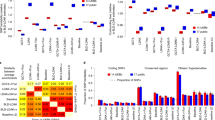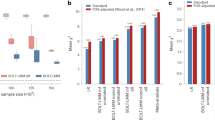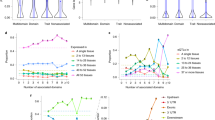Abstract
Narrow-sense heritability (h2) is an important genetic parameter that quantifies the proportion of phenotypic variance in a trait attributable to the additive genetic variation generated by all causal variants. Estimation of h2 previously relied on closely related individuals, but recent developments allow estimation of the variance explained by all SNPs used in a genome-wide association study (GWAS) in conventionally unrelated individuals, that is, the SNP-based heritability ( ). In this Perspective, we discuss recently developed methods to estimate
). In this Perspective, we discuss recently developed methods to estimate  for a complex trait (and genetic correlation between traits) using individual-level or summary GWAS data. We discuss issues that could influence the accuracy of
for a complex trait (and genetic correlation between traits) using individual-level or summary GWAS data. We discuss issues that could influence the accuracy of  , definitions, assumptions and interpretations of the models, and pitfalls of misusing the methods and misinterpreting the models and results.
, definitions, assumptions and interpretations of the models, and pitfalls of misusing the methods and misinterpreting the models and results.
This is a preview of subscription content, access via your institution
Access options
Access Nature and 54 other Nature Portfolio journals
Get Nature+, our best-value online-access subscription
$29.99 / 30 days
cancel any time
Subscribe to this journal
Receive 12 print issues and online access
$209.00 per year
only $17.42 per issue
Buy this article
- Purchase on Springer Link
- Instant access to full article PDF
Prices may be subject to local taxes which are calculated during checkout




Similar content being viewed by others
References
Maher, B. Personal genomes: the case of the missing heritability. Nature 456, 18–21 (2008).
Manolio, T.A. et al. Finding the missing heritability of complex diseases. Nature 461, 747–753 (2009).
Xiao, R. & Boehnke, M. Quantifying and correcting for the winner's curse in genetic association studies. Genet. Epidemiol. 33, 453–462 (2009).
Visscher, P.M. Sizing up human height variation. Nat. Genet. 40, 489–490 (2008).
Fisher, R.A. The correlation between relatives on the supposition of Mendelian inheritance. Trans. R. Soc. Edinb. 52, 399–433 (1918).
Silventoinen, K. et al. Heritability of adult body height: a comparative study of twin cohorts in eight countries. Twin Res. 6, 399–408 (2003).
Macgregor, S., Cornes, B.K., Martin, N.G. & Visscher, P.M. Bias, precision and heritability of self-reported and clinically measured height in Australian twins. Hum. Genet. 120, 571–580 (2006).
Goldstein, D.B. Common genetic variation and human traits. N. Engl. J. Med. 360, 1696–1698 (2009).
Eichler, E.E. et al. Missing heritability and strategies for finding the underlying causes of complex disease. Nat. Rev. Genet. 11, 446–450 (2010).
Schork, N.J., Murray, S.S., Frazer, K.A. & Topol, E.J. Common vs. rare allele hypotheses for complex diseases. Curr. Opin. Genet. Dev. 19, 212–219 (2009).
Gibson, G. Rare and common variants: twenty arguments. Nat. Rev. Genet. 13, 135–145 (2012).
Visscher, P.M., Brown, M.A., McCarthy, M.I. & Yang, J. Five years of GWAS discovery. Am. J. Hum. Genet. 90, 7–24 (2012).
Yang, J. et al. Common SNPs explain a large proportion of the heritability for human height. Nat. Genet. 42, 565–569 (2010).
Yang, J. et al. Genetic variance estimation with imputed variants finds negligible missing heritability for human height and body mass index. Nat. Genet. 47, 1114–1120 (2015).
Wood, A.R. et al. Defining the role of common variation in the genomic and biological architecture of adult human height. Nat. Genet. 46, 1173–1186 (2014).
Locke, A.E. et al. Genetic studies of body mass index yield new insights for obesity biology. Nature 518, 197–206 (2015).
Schizophrenia Working Group of the Psychiatric Genomics Consortium. Biological insights from 108 schizophrenia-associated genetic loci. Nature 511, 421–427 (2014).
Okada, Y. et al. Genetics of rheumatoid arthritis contributes to biology and drug discovery. Nature 506, 376–381 (2014).
Liu, J.Z. et al. Association analyses identify 38 susceptibility loci for inflammatory bowel disease and highlight shared genetic risk across populations. Nat. Genet. 47, 979–986 (2015).
Liu, C. et al. Meta-analysis identifies common and rare variants influencing blood pressure and overlapping with metabolic trait loci. Nat. Genet. 48, 1162–1170 (2016).
Yang, J. et al. Ubiquitous polygenicity of human complex traits: genome-wide analysis of 49 traits in Koreans. PLoS Genet. 9, e1003355 (2013).
Loh, P.R. et al. Contrasting genetic architectures of schizophrenia and other complex diseases using fast variance-components analysis. Nat. Genet. 47, 1385–1392 (2015).
Benjamin, D.J. et al. The genetic architecture of economic and political preferences. Proc. Natl. Acad. Sci. USA 109, 8026–8031 (2012).
Yang, J., Lee, S.H., Goddard, M.E. & Visscher, P.M. GCTA: a tool for genome-wide complex trait analysis. Am. J. Hum. Genet. 88, 76–82 (2011).
Lee, S.H., Wray, N.R., Goddard, M.E. & Visscher, P.M. Estimating missing heritability for disease from genome-wide association studies. Am. J. Hum. Genet. 88, 294–305 (2011).
Lee, S.H., Yang, J., Goddard, M.E., Visscher, P.M. & Wray, N.R. Estimation of pleiotropy between complex diseases using single-nucleotide polymorphism–derived genomic relationships and restricted maximum likelihood. Bioinformatics 28, 2540–2542 (2012).
Lee, S.H. et al. Genetic relationship between five psychiatric disorders estimated from genome-wide SNPs. Nat. Genet. 45, 984–994 (2013).
Wray, N.R. Allele frequencies and the r2 measure of linkage disequilibrium: impact on design and interpretation of association studies. Twin Res. Hum. Genet. 8, 87–94 (2005).
Speed, D., Hemani, G., Johnson, M.R. & Balding, D.J. Improved heritability estimation from genome-wide SNPs. Am. J. Hum. Genet. 91, 1011–1021 (2012).
Gusev, A. et al. Quantifying missing heritability at known GWAS loci. PLoS Genet. 9, e1003993 (2013).
Yang, J., Lee, S.H., Wray, N.R., Goddard, M.E. & Visscher, P.M. GCTA-GREML accounts for linkage disequilibrium when estimating genetic variance from genome-wide SNPs. Proc. Natl. Acad. Sci. USA 113, E4579–E4580 (2016).
Krishna Kumar, S., Feldman, M.W., Rehkopf, D.H. & Tuljapurkar, S. Limitations of GCTA as a solution to the missing heritability problem. Proc. Natl. Acad. Sci. USA 113, E61–E70 (2016).
Gusev, A. et al. Partitioning heritability of regulatory and cell-type-specific variants across 11 common diseases. Am. J. Hum. Genet. 95, 535–552 (2014).
Lee, S.H. et al. Estimation of SNP heritability from dense genotype data. Am. J. Hum. Genet. 93, 1151–1155 (2013).
Lee, S.H. et al. Estimating the proportion of variation in susceptibility to schizophrenia captured by common SNPs. Nat. Genet. 44, 247–250 (2012).
Evans, L. et al. Comparison of methods that use whole genome data to estimate the heritability and genetic architecture of complex traits. bioRxiv https://dx.doi.org/10.1101/115527 (2017).
Visscher, P.M. et al. Statistical power to detect genetic (co)variance of complex traits using SNP data in unrelated samples. PLoS Genet. 10, e1004269 (2014).
Marouli, E. et al. Rare and low-frequency coding variants alter human adult height. Nature 542, 186–190 (2017).
Purcell, S.M. et al. A polygenic burden of rare disruptive mutations in schizophrenia. Nature 506, 185–190 (2014).
Fuchsberger, C. et al. The genetic architecture of type 2 diabetes. Nature 536, 41–47 (2016).
Speed, D., Cai, N., Johnson, M.R., Nejentsev, S. & Balding, D.J. Reevaluation of SNP heritability in complex human traits. Nat. Genet. 49, 986–992 (2017).
Gazal, S. et al. Linkage disequilibrium dependent architecture of human complex traits reveals action of negative selection. bioRxiv https://dx.doi.org/10.1101/082024 (2016).
Zeng, J. et al. Widespread signatures of negative selection in the genetic architecture of human complex traits. bioRxiv https://dx.doi.org/10.1101/145755 (2017).
Haseman, J.K. & Elston, R.C. The investigation of linkage between a quantitative trait and a marker locus. Behav. Genet. 2, 3–19 (1972).
Golan, D., Lander, E.S. & Rosset, S. Measuring missing heritability: inferring the contribution of common variants. Proc. Natl. Acad. Sci. USA 111, E5272–E5281 (2014).
Zhu, Z. et al. Dominance genetic variation contributes little to the missing heritability for human complex traits. Am. J. Hum. Genet. 96, 377–385 (2015).
Hill, W.G., Goddard, M.E. & Visscher, P.M. Data and theory point to mainly additive genetic variance for complex traits. PLoS Genet. 4, e1000008 (2008).
Rönnegård, L., Pong-Wong, R. & Carlborg, O. Defining the assumptions underlying modeling of epistatic QTL using variance component methods. J. Hered. 99, 421–425 (2008).
Lynch, M. & Walsh, B. Genetics and Analysis of Quantitative Traits (Sinauer Associates, 1998).
Pasaniuc, B. & Price, A.L. Dissecting the genetics of complex traits using summary association statistics. Nat. Rev. Genet. 18, 117–127 (2017).
Palla, L. & Dudbridge, F. A fast method that uses polygenic scores to estimate the variance explained by genome-wide marker panels and the proportion of variants affecting a trait. Am. J. Hum. Genet. 97, 250–259 (2015).
Dudbridge, F. Power and predictive accuracy of polygenic risk scores. PLoS Genet. 9, e1003348 (2013).
Shi, H., Kichaev, G. & Pasaniuc, B. Contrasting the genetic architecture of 30 complex traits from summary association data. Am. J. Hum. Genet. 99, 139–153 (2016).
Bulik-Sullivan, B.K. et al. LD Score regression distinguishes confounding from polygenicity in genome-wide association studies. Nat. Genet. 47, 291–295 (2015).
Bulik-Sullivan, B. et al. An atlas of genetic correlations across human diseases and traits. Nat. Genet. 47, 1236–1241 (2015).
Finucane, H.K. et al. Partitioning heritability by functional annotation using genome-wide association summary statistics. Nat. Genet. 47, 1228–1235 (2015).
Yang, J. et al. Genome-wide genetic homogeneity between sexes and populations for human height and body mass index. Hum. Mol. Genet. 24, 7445–7449 (2015).
Lynch, M. & Ritland, K. Estimation of pairwise relatedness with molecular markers. Genetics 152, 1753–1766 (1999).
Hayes, B.J., Visscher, P.M. & Goddard, M.E. Increased accuracy of artificial selection by using the realized relationship matrix. Genet. Res. (Camb.) 91, 47–60 (2009).
Browning, B.L. & Browning, S.R. A fast, powerful method for detecting identity by descent. Am. J. Hum. Genet. 88, 173–182 (2011).
Sudlow, C. et al. UK biobank: an open access resource for identifying the causes of a wide range of complex diseases of middle and old age. PLoS Med. 12, e1001779 (2015).
Acknowledgements
We thank A. Price for his constructive and helpful comments on an earlier version of the manuscript. This research was supported by the Australian National Health and Medical Research Council (1078901, 1078037 and 1113400), the Australian Research Council (DP160101343), the US National Institutes of Health (GM099568 and MH100141-01), and the Sylvia & Charles Viertel Charitable Foundation (Senior Medical Research Fellowship). This research has been conducted using data from dbGaP (accessions phs000090.v3.p1 and phs000091.v2.p1), the UK10K Project and the UK Biobank Resource (application number 12514). A full list of acknowledgments to these data sets can be found in the Supplementary Note.
Author information
Authors and Affiliations
Corresponding authors
Ethics declarations
Competing interests
The authors declare no competing financial interests.
Supplementary information
Supplementary Texts and Tables
Supplementary Note and Supplementary Tables 1–3 (PDF 7978 kb)
Rights and permissions
About this article
Cite this article
Yang, J., Zeng, J., Goddard, M. et al. Concepts, estimation and interpretation of SNP-based heritability. Nat Genet 49, 1304–1310 (2017). https://doi.org/10.1038/ng.3941
Received:
Accepted:
Published:
Issue Date:
DOI: https://doi.org/10.1038/ng.3941
This article is cited by
-
Disentangling direct and indirect genetic effects from partners and offspring on maternal depression using trio-GCTA
Nature Mental Health (2024)
-
Principles and methods for transferring polygenic risk scores across global populations
Nature Reviews Genetics (2024)
-
Estimating the heritability of SARS-CoV-2 susceptibility and COVID-19 severity
Nature Communications (2024)
-
Balancing genomic selection efforts for allogamous plant breeding programs
Journal of Crop Science and Biotechnology (2024)
-
Study protocol of the Berlin Research Initiative for Diagnostics, Genetics and Environmental Factors in Schizophrenia (BRIDGE-S)
BMC Psychiatry (2023)



